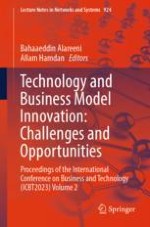This book proceedings addresses a crucial gap in understanding the impact of technology on Business Model Innovation (BMI). It emphasizes the need for further research to explore the intricate relationship between technology and BMI, focusing on opportunities and challenges. By delving into how technology influences emerging business model innovations and enhances operational efficiency, the publication aims to advance knowledge. Inviting diverse research methods, it sheds light on various ideas within the technology and BMI realm. Tailored for students, scholars, professionals, and policymakers, this book contributes to the evolving field of BMI and technology.
